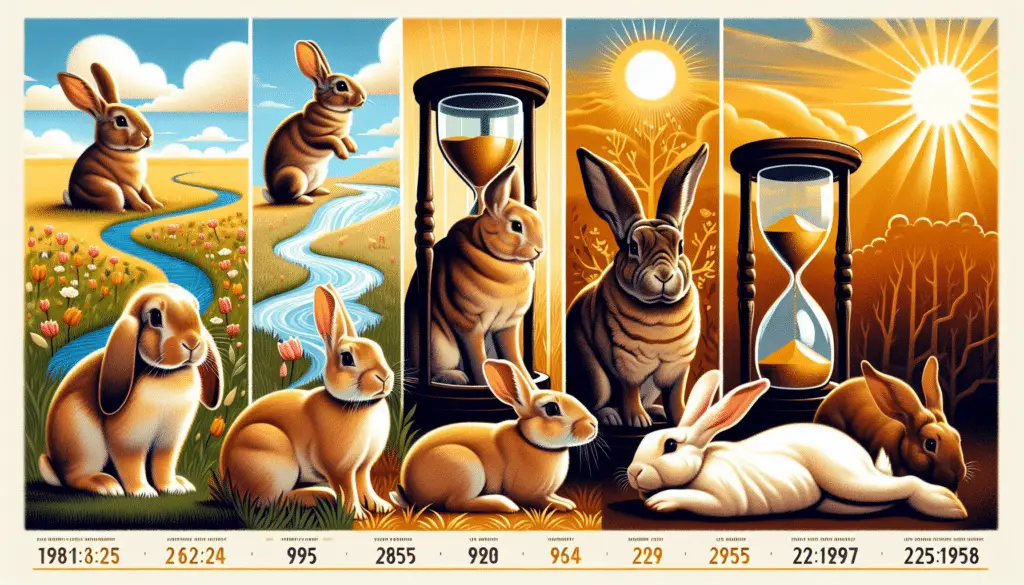Introduction to Rabbit Lifespan
Table of Contents
ToggleThe lifespan of a rabbit can vary significantly based on several factors including breed, diet, and living conditions.
While many people choose rabbits as pets, understanding their expected lifespan is crucial to ensure you’re prepared for the commitment.
In this article, we’ll dive into the lifespans of various rabbit breeds and explore what affects their longevity.
Average Lifespan of Popular Rabbit Breeds
Rabbits can have different lifespans depending on their breed.
**The average lifespan of domestic rabbits is about 8 to 12 years.**
Here, we’ll discuss the lifespans of some of the most popular rabbit breeds.
Holland Lop
The Holland Lop is a small, friendly breed known for its distinctive floppy ears.
On average, Holland Lops live between 7 to 10 years.
These rabbits are popular pets due to their size and docile nature.
Mini Rex
The Mini Rex is valued for its unique fur, which is velvety and plush.
This breed generally lives between 8 to 10 years.
Due to its friendly and calm demeanor, the Mini Rex is a favorite among families.
Netherland Dwarf
The Netherland Dwarf is one of the smallest rabbit breeds, often weighing less than 2.5 pounds.
They have a lifespan of about 7 to 10 years.
These rabbits are high-energy but also affectionate.
Flemish Giant
As one of the largest rabbit breeds, the Flemish Giant can weigh up to 15 pounds or more.
On average, Flemish Giants live 5 to 8 years.
While they are gentle giants, their considerable size requires more space and care.
Angora Rabbit
Angora rabbits are famous for their long, soft wool, which is often harvested for knitting.
This breed generally lives between 7 to 12 years.
Angora rabbits require regular grooming to maintain their coat, adding to their care needs.
Lionhead Rabbit
The Lionhead Rabbit is known for its distinctive mane of fur around its head, resembling a lion’s mane.
This breed typically lives 7 to 9 years.
These rabbits are playful and affectionate, making them great pets for children.
Factors Influencing Rabbit Lifespan
Several factors can influence the lifespan of a rabbit, regardless of its breed.
Diet, living conditions, and medical care play central roles in how long a rabbit will live.
Ensuring that a rabbit has a balanced diet, a clean living environment, and regular veterinary checkups can significantly extend its lifespan.
Quality of Diet
A balanced diet that includes fresh hay, vegetables, and high-quality rabbit pellets can contribute to a longer life.
It’s said that many rabbits benefit from having constant access to fresh water and hay, which aids in digestion.
Living Conditions
Rabbits thrive in clean, spacious environments.
A well-ventilated space free of extreme temperatures is essential for their well-being.
Providing them with a safe and comfortable cage or hutch can help maintain their overall health.
Medical Care
Regular veterinary checkups are crucial in detecting any health issues early on.
Vaccinations and preventive care can protect rabbits from common diseases.
Spaying or neutering is also recommended as it can prevent certain cancers and improve overall longevity.
Preventing Common Health Issues
Rabbits can suffer from a variety of health issues such as dental problems, gastrointestinal stasis, and respiratory infections.
Pet owners should be vigilant and look out for signs of distress, loss of appetite, or unusual behavior.
Immediate veterinary attention can make a significant difference in treating these conditions successfully.
Emotional Well-being
Just like people, rabbits benefit greatly from mental stimulation and social interaction.
Providing toys and spending quality time with your rabbit can lead to a happier, longer life.
Bonding with your rabbit builds trust and helps reduce stress levels, which can affect their health.
Providing a Safe Environment
Ensuring that the environment is rabbit-proofed is essential for their safety.
Rabbits are curious creatures and may chew on harmful objects like electrical wires.
Setting up a rabbit-friendly area that is free from potential dangers reduces the risk of injuries.
Understanding Rabbit Behavior
Understanding your rabbit’s behavior can help in identifying any changes in their health and wellness.
Rabbits have unique behaviors and personalities, and sudden changes can be a sign of underlying health issues.
Knowing your rabbit’s normal behavior helps you spot anomalies quickly.
Products to Enhance Rabbit Lifespan
There are various products available that can help in enhancing the lifespan and quality of life of your rabbit.
High-quality rabbit pellets, timely grooming kits, and spacious cages are some products that could contribute to their well-being.
One popular product is the Oxbow Essentials Rabbit Food, which is well-reviewed for its nutritional value.
Pros
- High in fiber
- Contains essential vitamins and minerals
- Suitable for all breeds
Cons
- Can be pricey
- Pellets may be too large for smaller breeds
Find This and More on Amazon
Another essential product is the Kaytee Rabbit Home Plus, which offers a spacious and safe living environment.
Pros
- Spacious design
- Easy to clean
- Comes with additional accessories
Cons
- Assembly can be challenging
- May be too large for smaller living spaces
Find This and More on Amazon
Breeding and Offspring
Depending on the breed, rabbits can start breeding as early as 3 to 8 months of age.
Breeding can take place year-round, with the female, or doe, having the capacity to produce multiple litters annually.
On average, a rabbit’s gestation period is about 28 to 31 days, and a litter usually consists of 4 to 12 kits.
Rabbit Population and Conservation
The population of domestic rabbits remains stable due to breeding programs and their popularity as pets.
However, some wild rabbit species face threats due to habitat loss and disease.
Conservation efforts aim to protect these wild populations and ensure their survival.
Interrelated Species
Different breeds of rabbits may coexist with other species such as the American Chinchilla or the Flemish Giant.
Understanding how these breeds interact with other animals can give you a better perspective on your pet’s social needs.
Frequently Asked Questions about Rabbit Lifespan
How long do rabbits live on average?
Most domestic rabbits live an average of 8 to 12 years, though this can vary based on breed and care.
What breed of rabbit lives the longest?
Smaller breeds like the Netherland Dwarf and Mini Rex tend to have longer lifespans, averaging around 10 years.
How can I extend my rabbit’s lifespan?
Providing a balanced diet, regular healthcare, social interaction, and a safe living environment can extend your rabbit’s lifespan.
Do rabbits live longer indoors or outdoors?
Rabbits generally live longer when kept indoors as they are protected from predators, extreme weather, and other risks.
Is it necessary to spay or neuter my rabbit?
Spaying or neutering can extend your rabbit’s lifespan by reducing the risk of certain cancers and promoting better health.
Conclusion
In summary, the lifespan of rabbits varies widely depending on their breed and the care they receive.
Knowing the specific needs of your rabbit breed can help you provide the best possible care and extend your pet’s life.
With proper nutrition, a safe environment, regular veterinary checkups, and lots of love, your rabbit can lead a long and happy life.
Lionhead Rabbit
The Lionhead Rabbit is known for its distinctive mane of fur around its head, resembling a lion’s mane.
This breed typically lives 7 to 9 years.
These rabbits are playful and affectionate, making them great pets for children.
An In-Depth Look at Lionhead Rabbit’s Lifespan
The Lionhead rabbit, with its unique and adorable appearance, is often a favorite among pet owners.
They are known for their friendly and curious nature.
Regular grooming is essential for Lionhead rabbits due to their thick mane, which can become matted without proper care.
A proper diet consisting of hay, fresh vegetables, and high-quality pellets can contribute to their overall health.
Ensuring they have ample space to hop around and play can also keep them mentally and physically stimulated.
English Spot Rabbit
The English Spot Rabbit is recognizable by its distinct spotted coat and eye markings.
This breed generally lives between 5 to 9 years.
They are active and enjoy lots of space to explore and play.
English Spot Rabbit: Health and Longevity
English Spot rabbits, with their beautiful spotted coats, are often chosen for their aesthetic appeal.
They need a balanced diet with a good mix of hay, vegetables, and pellets to maintain their health.
They are known to be active and require lots of space for exercise to stay healthy.
Regular veterinary checkups can catch potential health issues early, contributing to a longer lifespan.
Consistent Care for Longer Lifespans
Regardless of breed, consistent care is key to ensuring your rabbit lives a long, healthy life.
Regular grooming, a balanced diet, and a safe environment are crucial.
Paying attention to their mental and physical stimulation needs can also enhance their quality of life.
Vitamins and Supplements for Rabbits
It’s often debated whether rabbits need additional vitamins and supplements beyond their regular diet.
For many rabbits, a balanced diet will provide all the necessary nutrients they need.
However, consult with your vet about any specific dietary requirements your rabbit might have.
Some rabbit owners find that supplements can help with certain health conditions or life stages.
Timothy Hay as a Dietary Staple
Timothy hay is widely recommended as a dietary staple for rabbits.
It is high in fiber and helps with their digestive health.
Offering fresh, high-quality Timothy hay daily can significantly contribute to their well-being.
It’s said that many rabbits enjoy munching on Timothy hay, making it both a necessity and a treat.
Social Interaction and Rabbits
Rabbits are social animals and can benefit greatly from interaction with their owners and, in some cases, other rabbits.
Consider getting a compatible companion for your rabbit to keep them company.
Ensure any introductions are done gradually to avoid stress and aggression.
Spending time each day interacting with your rabbit can help them feel more secure and happy.
Understanding Rabbit Health Issues
Being aware of common rabbit health issues can help you act quickly if problems arise.
Dental issues, such as overgrown teeth, are common and require regular checkups.
Gastrointestinal stasis is another serious condition that requires immediate veterinary attention.
Respiratory infections can also affect rabbits, so it’s important to monitor for any signs of illness.
Treatment Options for Common Illnesses
If your rabbit shows signs of illness, it’s important to consult with a vet experienced in rabbit health.
Prompt treatment can often make a significant difference in the outcome.
Regular checkups and preventive care can help avoid many health issues.
A vet can provide targeted advice and treatment plans tailored to your rabbit’s specific needs.
Frequently Asked Questions about Rabbit Lifespan
How long do rabbits live on average?
Most domestic rabbits live an average of 8 to 12 years, though this can vary based on breed and care.
What breed of rabbit lives the longest?
Smaller breeds like the Netherland Dwarf and Mini Rex tend to have longer lifespans, averaging around 10 years.
How can I extend my rabbit’s lifespan?
Providing a balanced diet, regular healthcare, social interaction, and a safe living environment can extend your rabbit’s lifespan.
Do rabbits live longer indoors or outdoors?
Rabbits generally live longer when kept indoors as they are protected from predators, extreme weather, and other risks.
Is it necessary to spay or neuter my rabbit?
Spaying or neutering can extend your rabbit’s lifespan by reducing the risk of certain cancers and promoting better health.
Rabbits can be wonderful pets and companions, offering years of joy and friendship when given the proper care.



